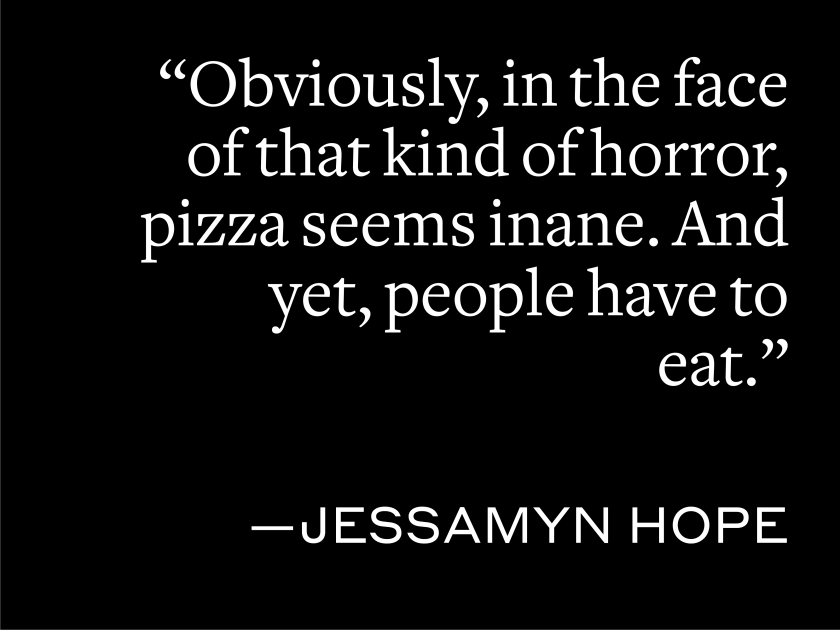Join a community of readers who are committed to Jewish stories
Sign up for JBC’s Nu Reads, a curated selection of Jewish books delivered straight to your door!

This piece is one of an ongoing series that we will be sharing in the coming days from Israeli authors and authors in Israel.
It is critical to understand history not just through the books that will be written later, but also through the first-hand testimonies and real-time accounting of events as they occur. At Jewish Book Council, we understand the value of these written testimonials and of sharing these individual experiences. It’s more important now than ever to give space to these voices and narratives.
In collaboration with the Jewish Book Council, JBI is recording writers’ first-hand accounts, as shared with and published by JBC, to increase the accessibility of these accounts for individuals who are blind, have low vision or are print disabled.
During World War II, Louis G. Schwartz, a waiter at the Sixth Avenue Deli, single handedly raised nine million dollars for the war effort with the slogan “You’ll buy War Bonds sooner or later / So get them today from Louie the Waiter.” He also came up with “Send a Salami to Your Boy in the Army,” which became the catchphrase for Katz’s Delicatessen.
So, it was fitting that this past Wednesday my husband, Yoav, wore his Katz’s t‑shirt to our volunteer job at Pizza Badash in Tel Aviv, where we were making pizzas for people sitting shiva, that is, mourning a loved one. But it’s not simply “mourning a loved one” because that doesn’t capture what we’re talking about here. We’re talking about people who may have first learned of their grandmother’s murder on Facebook, because after Hamas infiltrators slaughtered her, they took her cellphone, and used it to post pictures of her butchered body on her Facebook wall.
Obviously, in the face of that kind of horror, pizza seems inane. And yet, people have to eat.
Yoav and I landed in Tel Aviv a month ago to spend the year here while he’s on sabbatical from New York University, where he’s a professor of learning sciences. Needless to say, the year isn’t going as planned. We were searching for ways to help when we received a text message that a pizzeria, whose owner had been called up, had opened its doors for volunteers to make pies for grieving families. We jumped on rental scooters. The call was for people to fold boxes, but when we arrived, they already had enough folders. What they didn’t have, though, were enough volunteers who knew how to make pizza. Some messes were coming out of the oven.
As fate would have it, Yoav has been obsessed with pizza-making for the past year. In his usual scientist fashion, he’s been testing and retesting hydration percentage, fermentation processes, proofing time, flour types, stretching techniques, and how to best launch the dough with the steel peel. Within forty-eight hours of landing in Tel Aviv, he had bought a used pizza oven and begun testing what needed to be done differently in this hotter climate. After I told the overseer of the volunteer operation, Miriam, that my husband had “studied” pizza, she said, “Get him behind the counter.” And that’s how I landed there, too.
The whole time we made pizzas, the rocket sirens kept sounding off, forcing everyone to drop the boxes they were folding or the tomato sauce they were scooping and run for cover. It was make pizza, hide from rockets, make pizza, hide from rockets, repeat. The first two times, everyone ran to the stairwell. When I asked the guy sheltering next to me why the stairwell, he said it was to get as far away as possible from glass, like the pizzeria’s storefront. One explosion boomed so loud, I felt the thunder in my chest. Everyone glanced at each other, acknowledging how near the rocket must have been.
When the sirens wailed a third time, we ran to a protected room on the second floor of the building next door. When we left that shelter, we passed an older woman on the stairs, seated next to her son, who was holding her while she remained gripped by panic. Perhaps she couldn’t climb the stairs fast enough to get to the protected room. One of the pizza volunteers offered her water and, at first, the woman could only stare at the volunteer and the half-drunk bottle in terrified confusion, her eyes oddly blank and her mouth in a small static o. Then, understanding, she reached out.
Unfortunately, when you leave pizzas in the oven to hide in a bomb shelter, they burn. Those pies ended up in the garbage instead of being carried off to grieving families.
The views and opinions expressed above are those of the author, based on their observations and experiences.
Support the work of Jewish Book Council and become a member today.
Jessamyn Hope is the author of the novel Safekeeping, winner of the J.I. Segal Award and a finalist for both the Ribalow Prize and the Paterson Fiction Prize. Her memoirs and short stories — originally published in Ploughshares, The Common, and elsewhere — have received two Pushcart Prize honorable mentions, been named a Best American Notable Essay, and have been anthologized in Best Canadian Essays, The Broadview Anthology of Expository Prose, and The New Spice Box: Contemporary Jewish Writing. She grew up in Montreal, has long lived in New York City, and is spending the year in Tel Aviv.